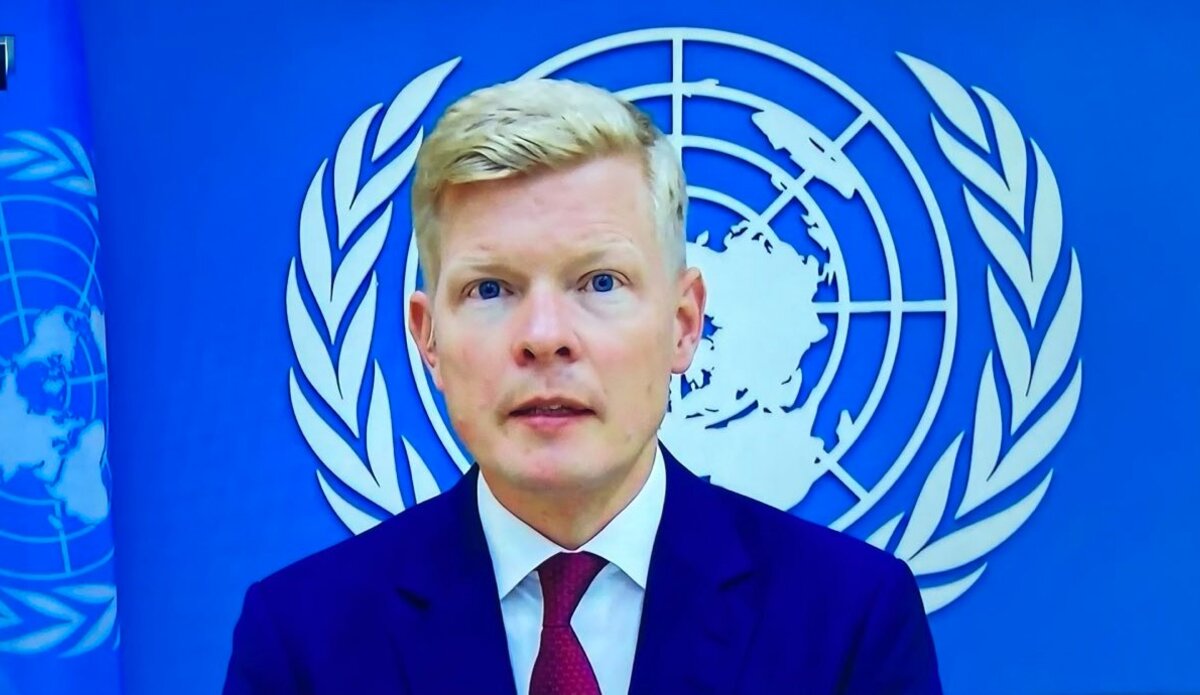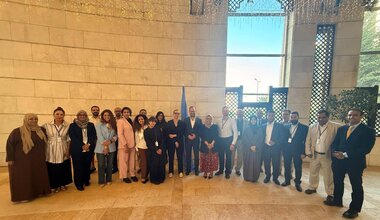SPECIAL ENVOY HANS GRUNBERG’S INTERVIEW WITH AL HADATH
Doha Al Zohairy: Let’s start from the latest developments, especially what is happening in maritime navigation. Yesterday, the Rubymar vessel, which was targeted by the Houthis two weeks ago, sank. To what extent does the sinking of this ship represent an indicator, not only of the scale of the Houthi escalation, but also its danger to maritime navigation and also to the environment?
UN Special Envoy Hans Grundberg: Thank you. It is clear, and it goes without saying, that the United Nations has been following the recent escalation in the region and also the escalation that we have seen in the Red Sea with an increasing level of concern.
And that concern is multifaceted and goes in different levels. On one end, there is the clear military and political dimension of that escalation. That is a source of concern from my end.
But there is obviously also the other aspect that you just highlighted, and that is the threat that it has, that it implies for the freedom of navigation, and also the consequences for the environment when we see ships that are sunk as we have seen with Rubymar.
So, on that, from that perspective, I spent a large part of yesterday in close touch with the Resident Coordinator of the United Nations to Yemen, Julien Harneis, and discussed about the efforts from the United Nations in order to assess the effects that the sinking of the ship may have on the Red Sea.
In that sense, five experts will be traveling to Yemen within 48 hours from the United Nations Environment Programme, and will, in close coordination with the Ministry of Environment of Yemen, initiate some of the assessment on the consequences that the sinking of the Rubymar may have on the Red Sea.
Al Zohairy: You spoke of a UN roadmap in December. Do you think this roadmap has a chance of succeeding now, or have the current tensions and the Houthi escalation in maritime navigation and the Gulf of Aden, in addition to the United States’ designation or re-designation of the Houthis on terrorist lists, completely confused the calculations?
Grundberg: So, I believe that, I firmly believe that the roadmap that we are engaging with parties on not only has the possibility to be reached, it is a must for the parties to come to that level of understanding in in order to make use of the progress that we have seen so far and take Yemen towards the more important steps that needs to be taken to lead to a serious ceasefire and to lead to a political process. So, from that point of view, I do not only think that it is possible, but that it is absolutely necessary. It is clear, however, as you highlighted that the environment, the mediation environment has become more complicated given the recent development in the region.
That is something that anyone that follows the developments in the Middle East will understand, but it is not an issue that I believe is an obstacle that is impossible to overcome. I believe that we definitely have the possibility to do so.
And more importantly, I think that this is something that the Yemeni themselves will understand very well; more importantly, the needs for Yemen will remain the same with or without the current escalation in the region.
The needs of the Yemenis when it comes to the need for the payment of salaries remain. There is also a need for roads in Yemen to open.
There is a need for Yemenis to be able to travel inside and outside of Yemen. There is a need for a ceasefire to be established so that Yemenis can live again with the guarantee that the war is not coming back. And finally, there is also a need for the political process to resume so that Yemenis can start defining their future by themselves. So, these priorities that I just highlighted remain my priority, remain the priority of the United Nations.
That is something that I would concentrate myself on with or without the current escalation that we have seen. And that remains the priority of the work of the United Nations.
Al Zohairy: You mentioned a moment ago the lives of the Yemenis. The United States of America has always opposed putting the Houthis back on the terrorist lists out of concern for the impact this would have on the peace process and on sending aid on the status and lives of Yemenis. Now and following the designation, to what extent does putting the Houthis back on the terrorist lists affect the Yemeni economy, the lives of Yemenis, and humanitarian aid?
Grundberg: Yes, that is an important question.
It is a question that we have been following with concern and a question that we are following with great level of priority.
In all circumstances such as this one, the first priority is to assess the impact that such a designation will have on the ability of the United Nations to deliver humanitarian aid. That is the first priority. And here you will have listened to my colleagues from OCHA in the security council briefing in February, outlining their views on this matter.
And they remain in close touch with the United States to ensure that the United Nations receive the necessary licenses to be able to carry out and to continue to assist with the humanitarian support to Yemen.
And you also highlight in your question a broader question, and that is the overall question related to the economy. It is an important one because, in situations such as the one that we see right now in Yemen, there is always a concern that designation might have a chilling effect on the economy as a whole. And that is a question that we follow closely.
That brings me to just, if you may, underline the centrality of the economy in a situation such as the one that we see in Yemen. That is a question that I have been focusing on and underlining on numerous occasions. And it is an issue where I think has a potential of delivering real tangible results for the Yemenis themselves if it is well managed within the context of the mediation efforts that we are engaging with the parties themselves on. And that is also the reason why we have integrated the economy as part of the tracks that we want to see being achieved in the roadmap. And what I am engaging in right now with the parties themselves is preparing for the creation of the joint economic committee where matters related to the integration of the Yemeni economy can be addressed.
But, clearly, we need to take not all steps at once. We need to take one step at a time in order to achieve tangible results, but also with a great sense of urgency in order to address the challenges that the Yemenis are facing on a daily basis.
Al Zohairy: This point also takes us to other international positions. There were international positions taken after the Houthi escalation in maritime navigation, from the Guardian of Prosperity to the American-British strikes to the European Defense Force with which the European Union participated and then the US putting the Houthis back on terrorist lists. Are these new developments in international positions undermine or complicate efforts to bring about peace?
Grundberg: So, as I mentioned in my earlier responses, I do not think that we can come away from the realization that the destabilization in the situation, the current situation in the Middle East, is generating a broader complicating environment for mediated solutions.
Because, and I think that one of the most important reasons is that the priority of the world and of the international community becomes one that is immediate and that is related to the current escalation. And that is a complicating factor and a fact that we need to address.
But it does not take away, and I said that earlier, it does not take away, it does not negate the long-term trajectory that we are engaging in when it comes to Yemen.
It does not mean that the efforts that we have been engaging in are the wrong ones. On the contrary, it just underlies the necessity and the urgency for us to make progress on reaching tangible results and reaching a breakthrough when it comes to the mediation related to the roadmap and on all of the related elements that need to be achieved in that end.
Al Zohairy: On the point of international positions: There is a major disagreement between Russia and the United States regarding the escalation in the Red Sea. How do you deal with this major disagreement that is manifested in every Security Council session called for by Russia regarding what is happening in the Red Sea?
Grundberg: Yes, I think that the fact that the current development in the Middle East has generated different approaches and different points of view among several member states is nothing out of the ordinary.
And it is clearly a matter of concern for those who follow the question, but it is also an issue that I believe we will be able to overcome.
And the reason for that belief is, again, going back to Yemen, is that the international community, when it comes to the long-term trajectory of Yemen, has not moved. They are still united; there is no differences in terms of approach when it comes to the long-term trajectory of where Yemen should go, and that is: a just peace for the sake of Yemenis, a sustainable and just peace for the sake of Yemenis, that is, achieved, through negotiations under the auspices of the United Nations.
And here, wherever, regardless whether I travel to Washington, whether I travel to Moscow, or if I go to Beijing, or to London, or to Paris, I will receive the same level of support for that long-term trajectory.
So, the belief and the hope that I take with me in the efforts that I am engaging on and that the United Nations is engaging on is on the strong support that we are receiving from the international community on the long-term efforts that we are engaging on when it comes to Yemen as such.
Al Zohairy: What about the Saudi role? What is the importance of the Saudi role now, regarding insulating the peace process from the impact or the aftermath of the impact of the Houthi-US clash?
Grundberg: So, the role of Saudi Arabia, and I want to add also the role of Oman, in support of the efforts of the United Nations, of the mediation efforts of the United Nations, these last years, has been critical.
And this being the bordering countries to Yemen, I expect nothing less that these countries remain as forward as possible for the positive development on the mediation efforts of Yemen.
And that becomes even more important in this situation if we reach a breakthrough on the roadmap and we move into the implementation. The support that I need from the region and the support that I would need from the Yemen's neighbors, from Saudi Arabia and from Oman, will remain as critical as ever.
Al Zohairy: Yes, and regarding Iran, how does the United Nations approach the Iranian position and the Iranian role in light of accusations against Iran, not only in relation to obstructing peace in Yemen, but also in terms of inflaming the conflict in the Red Sea?
Grundberg: So, when I mentioned earlier that I am in need of the support of the region, I also want to enlarge that concept of the region and I do not want to exclude anyone.
And in that sense, you will have seen me since the beginning of my tenure establishing a firm and open and a trustworthy line of communication with Iran when it comes to settling the conflict in Yemen.
I have visited Iran on numerous occasions. I was there around three weeks ago. I had long and important discussions with the foreign minister where we discussed not only all the concerns about the overall escalation in the region, but also the need for constructive support for the United Nations mediation efforts to reach a peaceful settlement of the conflict in Yemen.
And those discussions will need to continue. And they will need to continue regardless of the state of play in the region. Because that is the role in the United Nations. We keep channels of communication open, and we look for support where we can get it.
And I will expect to continue constructive engagements with the Iranians on this issue.
Al Zohairy: But you have also mentioned the region, does this mean that peace in Yemen cannot be achieved in partnership with Iran and in isolation from the remaining regional files connected to Iran such as Lebanon, Iraq, and Syria?
Grundberg: So, that is a very important question, the one you ask here. And I think that it is critical for everyone to understand that and to realize that Yemen should not be and cannot be seen as a footnote in a broader regional context.
Yemen is an absolutely magnificent country with 30 million Yemenis who have been suffering for way too long. And they need and they deserve a chance to a just peace. And that is a priority that will remain to the core of my engagement.
And here, I think it is dangerous if you start conditionalizing those efforts with the broader developments in the region. And that is something that I will want to avoid to the greatest extent possible.
But, similarly, I think that if we, for example, reach progress on the mediation efforts that we are seeing in Yemen and generate some form, some stability and sustainable stability in Yemen, I am certain that this will have a positive impact on the region as I hope.
And likewise, if the region generates more stability, that can have a positive effect on the mediation that we are having in Yemen.
But the interlinkage and the conditionality is something that I want to avoid, and that is why I, for my end, will remain focused on Yemen and making sure that Yemenis themselves can define their own future.
Al Zohairy: UN Special Envoy to Yemen, Hans Grundberg, thank you very much for allowing us this opportunity. Many thanks.
Grundberg: Thank you very much. It has been a pleasure.
 UN
UN







